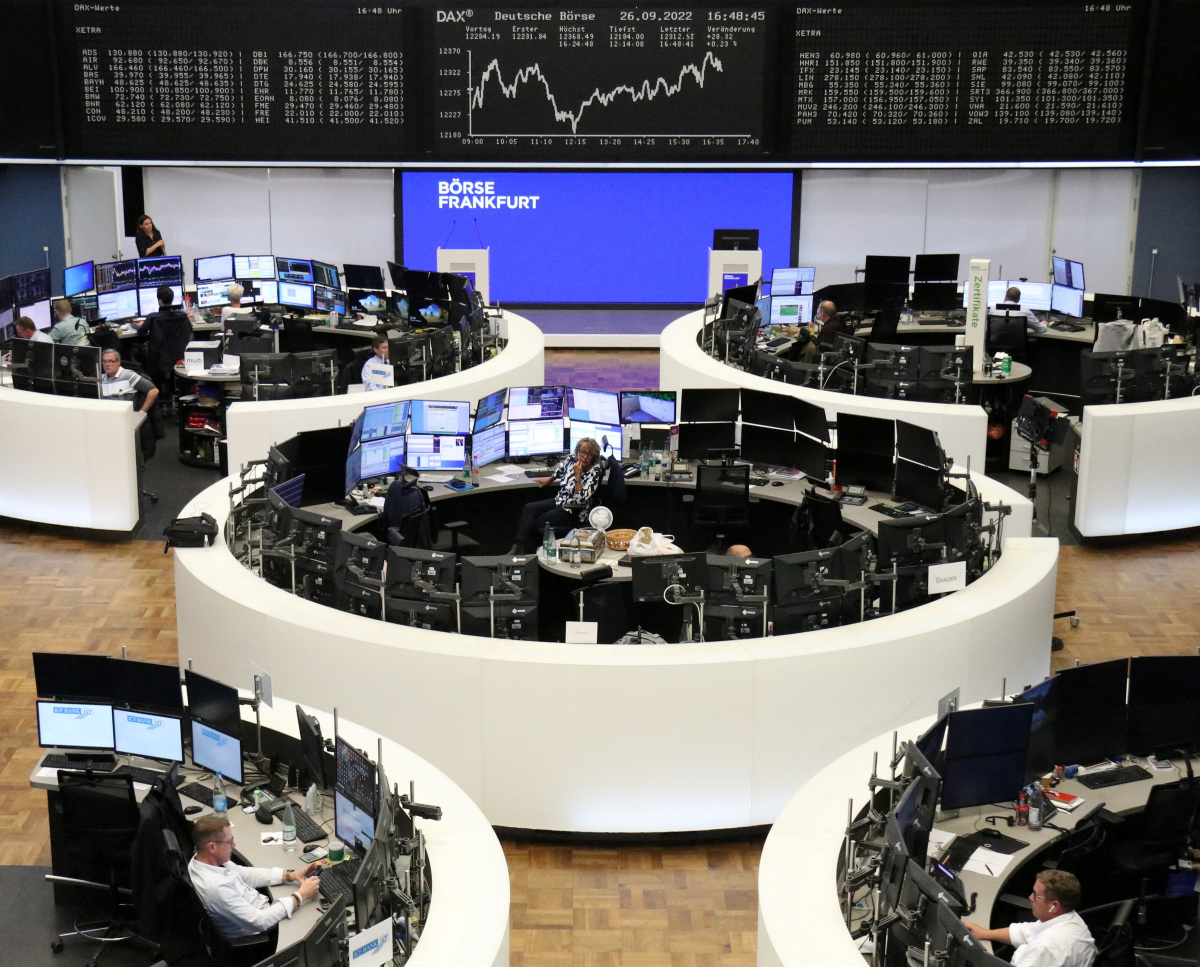The Impact Of Economic Slowdown: SSE Reduces Spending By £3 Billion

Table of Contents
Reasons Behind SSE's £3 Billion Spending Reduction
Several interconnected factors have driven SSE's decision to slash its spending by £3 billion. The current economic climate, characterized by high inflation, energy price volatility, and rising interest rates, has created a perfect storm of challenges for the company.
-
Soaring Inflation and Energy Price Volatility: Unprecedented inflation has increased the cost of materials, labor, and other inputs for energy projects. Simultaneously, the volatility in energy prices makes long-term investment planning exceptionally difficult, increasing the risk associated with large-scale projects. This uncertainty makes it harder to accurately predict future revenues and profitability, making investment a riskier proposition.
-
Rising Interest Rates: The Bank of England's efforts to combat inflation have led to significantly higher interest rates. This makes borrowing money more expensive, increasing the cost of financing major energy infrastructure projects like renewable energy farms and grid upgrades. The higher cost of capital makes projects less financially viable, forcing companies like SSE to re-evaluate their investment priorities.
-
Investment Uncertainty and Regulatory Changes: Uncertainty surrounding future energy regulations and government policies adds another layer of complexity. Changes in policy can impact the profitability and feasibility of energy projects, making investors hesitant to commit large sums of capital. This risk aversion further contributes to a reduction in overall investment.
-
Cost of Living Crisis and Consumer Spending: The ongoing cost of living crisis is impacting consumer spending, potentially leading to lower energy demand. This reduction in demand can make large-scale energy projects less attractive, leading to delays or cancellations to avoid potential losses.
-
Prioritizing Existing Infrastructure: In the face of these financial pressures, SSE is prioritizing the maintenance and operational efficiency of its existing infrastructure. This means that new investment projects are likely to be delayed or scaled back to ensure the reliable delivery of existing energy services.
Impact on SSE's Future Projects and Energy Infrastructure
SSE's £3 billion spending cut will inevitably impact its future projects and the UK's energy infrastructure. The consequences are far-reaching and potentially detrimental to the country's energy transition goals.
-
Delays in Renewable Energy Projects: Budget constraints will likely lead to delays in renewable energy projects, including wind farms and solar installations. This slowdown hinders the UK's progress towards its net-zero targets and reduces the country's reliance on fossil fuels.
-
Postponement of Grid Upgrades: Crucial upgrades to the national energy grid, essential for integrating renewable energy sources and ensuring energy supply resilience, may also be postponed. This can lead to increased risks of blackouts and power shortages in the future.
-
Hindered Energy Transition: Reduced investment in new energy infrastructure directly impacts the UK's ability to transition to a cleaner, more sustainable energy system. The slower pace of development makes achieving ambitious climate goals more challenging.
-
Impact on Job Creation and Economic Growth: The delay or cancellation of energy projects will inevitably lead to job losses within SSE and related supply chains, impacting economic growth and potentially creating regional economic hardship.
-
Slowdown in the Energy Transition: The overall energy transition process, crucial for tackling climate change and securing the UK's energy future, will likely be significantly slowed down by these reduced investments.
Wider Implications for the Energy Sector and the UK Economy
The ramifications of SSE's spending cuts extend beyond the company itself, impacting the broader energy sector and the UK economy as a whole.
-
Reduced Investor Confidence: SSE's decision could negatively impact investor confidence in the UK energy sector, making it harder to attract future investment, both domestic and foreign. This will hinder the development of new projects and technologies.
-
Potential Job Losses: Job losses are expected not only within SSE but also across the wider supply chain, potentially leading to significant economic disruption in affected regions.
-
Higher Consumer Bills: Insufficient investment in energy infrastructure could ultimately lead to higher energy prices for consumers due to supply constraints and increased reliance on more expensive energy sources.
-
Impact on Energy Security: The reduced investment in energy infrastructure threatens the UK's energy security, making it more vulnerable to supply disruptions and external price shocks.
-
Pressure on Government Policy: The situation places increased pressure on the government to implement supportive policies for the energy sector, providing incentives for investment and ensuring the stability and resilience of the UK's energy system.
Government Response and Potential Solutions
The government faces a significant challenge in responding to this crisis. Potential solutions include:
-
Fiscal Stimulus and Investment Incentives: The government could provide fiscal stimulus packages or introduce tax breaks and other investment incentives to encourage private sector investment in the energy sector.
-
Regulatory Reform: Streamlining regulatory processes and creating a more predictable and supportive regulatory environment can significantly boost investor confidence and encourage investment in energy projects.
-
Long-Term Strategies: Developing long-term strategies for managing economic slowdowns and ensuring continued investment in the energy sector is crucial for the UK's energy security and its ability to meet its climate commitments.
Conclusion
SSE's £3 billion spending cut serves as a stark warning of the severe impact of the current economic slowdown on the energy sector. This decision has far-reaching consequences for future energy projects, infrastructure development, and the UK's overall energy security. Rising inflation, interest rates, and regulatory uncertainties are major contributing factors. The situation underscores the urgent need for government intervention and the development of sustainable policies to support the energy sector and secure a resilient and affordable energy future for the UK.
Call to Action: Understanding the impact of this economic slowdown on major energy providers like SSE is crucial for ensuring a secure energy future. Stay informed about developments in the energy sector and advocate for policies that promote sustainable energy investment and a resilient energy future. Follow us for further updates on the impact of the economic slowdown and its effect on the energy sector.

Featured Posts
-
 Escape To The Country Living Sustainably In A Rural Environment
May 25, 2025
Escape To The Country Living Sustainably In A Rural Environment
May 25, 2025 -
 Soerloth Un La Liga Firtinasi Ilk 30 Dakikada 4 Gol
May 25, 2025
Soerloth Un La Liga Firtinasi Ilk 30 Dakikada 4 Gol
May 25, 2025 -
 Stoxx Europe 600 Ve Dax 40 Endeksleri Duestue Avrupa Borsalari Analizi 16 Nisan 2025
May 25, 2025
Stoxx Europe 600 Ve Dax 40 Endeksleri Duestue Avrupa Borsalari Analizi 16 Nisan 2025
May 25, 2025 -
 Report Reveals Explosive Growth In Us Tennis Participation 25 Million Players By August 2024
May 25, 2025
Report Reveals Explosive Growth In Us Tennis Participation 25 Million Players By August 2024
May 25, 2025 -
 Access Bbc Radio 1 Big Weekend 2025 Confirmed Lineup And Ticket Information
May 25, 2025
Access Bbc Radio 1 Big Weekend 2025 Confirmed Lineup And Ticket Information
May 25, 2025
